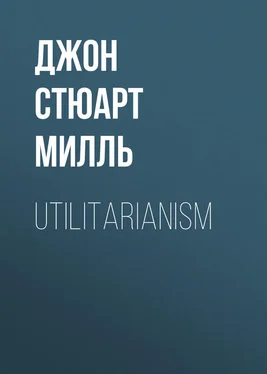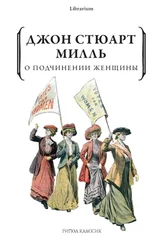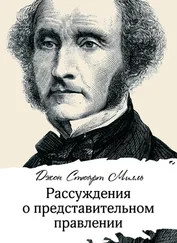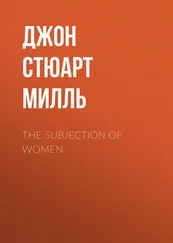Джон Милль - Utilitarianism
Здесь есть возможность читать онлайн «Джон Милль - Utilitarianism» — ознакомительный отрывок электронной книги совершенно бесплатно, а после прочтения отрывка купить полную версию. В некоторых случаях можно слушать аудио, скачать через торрент в формате fb2 и присутствует краткое содержание. Жанр: Философия, literature_19, foreign_antique, foreign_prose, на английском языке. Описание произведения, (предисловие) а так же отзывы посетителей доступны на портале библиотеки ЛибКат.
- Название:Utilitarianism
- Автор:
- Жанр:
- Год:неизвестен
- ISBN:нет данных
- Рейтинг книги:3 / 5. Голосов: 1
-
Избранное:Добавить в избранное
- Отзывы:
-
Ваша оценка:
- 60
- 1
- 2
- 3
- 4
- 5
Utilitarianism: краткое содержание, описание и аннотация
Предлагаем к чтению аннотацию, описание, краткое содержание или предисловие (зависит от того, что написал сам автор книги «Utilitarianism»). Если вы не нашли необходимую информацию о книге — напишите в комментариях, мы постараемся отыскать её.
Utilitarianism — читать онлайн ознакомительный отрывок
Ниже представлен текст книги, разбитый по страницам. Система сохранения места последней прочитанной страницы, позволяет с удобством читать онлайн бесплатно книгу «Utilitarianism», без необходимости каждый раз заново искать на чём Вы остановились. Поставьте закладку, и сможете в любой момент перейти на страницу, на которой закончили чтение.
Интервал:
Закладка:
On the present occasion, I shall, without further discussion of the other theories, attempt to contribute something towards the understanding and appreciation of the Utilitarian or Happiness theory, and towards such proof as it is susceptible of. It is evident that this cannot be proof in the ordinary and popular meaning of the term. Questions of ultimate ends are not amenable to direct proof. Whatever can be proved to be good, must be so by being shown to be a means to something admitted to be good without proof. The medical art is proved to be good, by its conducing to health; but how is it possible to prove that health is good? The art of music is good, for the reason, among others, that it produces pleasure; but what proof is it possible to give that pleasure is good? If, then, it is asserted that there is a comprehensive formula, including all things which are in themselves good, and that whatever else is good, is not so as an end, but as a mean, the formula may be accepted or rejected, but is not a subject of what is commonly understood by proof. We are not, however, to infer that its acceptance or rejection must depend on blind impulse, or arbitrary choice. There is a larger meaning of the word proof, in which this question is as amenable to it as any other of the disputed questions of philosophy. The subject is within the cognizance of the rational faculty; and neither does that faculty deal with it solely in the way of intuition. Considerations may be presented capable of determining the intellect either to give or withhold its assent to the doctrine; and this is equivalent to proof.
We shall examine presently of what nature are these considerations; in what manner they apply to the case, and what rational grounds, therefore, can be given for accepting or rejecting the utilitarian formula. But it is a preliminary condition of rational acceptance or rejection, that the formula should be correctly understood. I believe that the very imperfect notion ordinarily formed of its meaning, is the chief obstacle which impedes its reception; and that could it be cleared, even from only the grosser misconceptions, the question would be greatly simplified, and a large proportion of its difficulties removed. Before, therefore, I attempt to enter into the philosophical grounds which can be given for assenting to the utilitarian standard, I shall offer some illustrations of the doctrine itself; with the view of showing more clearly what it is, distinguishing it from what it is not, and disposing of such of the practical objections to it as either originate in, or are closely connected with, mistaken interpretations of its meaning. Having thus prepared the ground, I shall afterwards endeavour to throw such light as I can upon the question, considered as one of philosophical theory.
CHAPTER II.
WHAT UTILITARIANISM IS
A passing remark is all that needs be given to the ignorant blunder of supposing that those who stand up for utility as the test of right and wrong, use the term in that restricted and merely colloquial sense in which utility is opposed to pleasure. An apology is due to the philosophical opponents of utilitarianism, for even the momentary appearance of confounding them with any one capable of so absurd a misconception; which is the more extraordinary, inasmuch as the contrary accusation, of referring everything to pleasure, and that too in its grossest form, is another of the common charges against utilitarianism: and, as has been pointedly remarked by an able writer, the same sort of persons, and often the very same persons, denounce the theory "as impracticably dry when the word utility precedes the word pleasure, and as too practicably voluptuous when the word pleasure precedes the word utility." Those who know anything about the matter are aware that every writer, from Epicurus to Bentham, who maintained the theory of utility, meant by it, not something to be contradistinguished from pleasure, but pleasure itself, together with exemption from pain; and instead of opposing the useful to the agreeable or the ornamental, have always declared that the useful means these, among other things. Yet the common herd, including the herd of writers, not only in newspapers and periodicals, but in books of weight and pretension, are perpetually falling into this shallow mistake. Having caught up the word utilitarian, while knowing nothing whatever about it but its sound, they habitually express by it the rejection, or the neglect, of pleasure in some of its forms; of beauty, of ornament, or of amusement. Nor is the term thus ignorantly misapplied solely in disparagement, but occasionally in compliment; as though it implied superiority to frivolity and the mere pleasures of the moment. And this perverted use is the only one in which the word is popularly known, and the one from which the new generation are acquiring their sole notion of its meaning. Those who introduced the word, but who had for many years discontinued it as a distinctive appellation, may well feel themselves called upon to resume it, if by doing so they can hope to contribute anything towards rescuing it from this utter degradation. 1 1 The author of this essay has reason for believing himself to be the first person who brought the word utilitarian into use. He did not invent it, but adopted it from a passing expression in Mr. Galt's Annals of the Parish . After using it as a designation for several years, he and others abandoned it from a growing dislike to anything resembling a badge or watchword of sectarian distinction. But as a name for one single opinion, not a set of opinions – to denote the recognition of utility as a standard, not any particular way of applying it – the term supplies a want in the language, and offers, in many cases, a convenient mode of avoiding tiresome circumlocution.
The creed which accepts as the foundation of morals, Utility, or the Greatest Happiness Principle, holds that actions are right in proportion as they tend to promote happiness, wrong as they tend to produce the reverse of happiness. By happiness is intended pleasure, and the absence of pain; by unhappiness, pain, and the privation of pleasure. To give a clear view of the moral standard set up by the theory, much more requires to be said; in particular, what things it includes in the ideas of pain and pleasure; and to what extent this is left an open question. But these supplementary explanations do not affect the theory of life on which this theory of morality is grounded – namely, that pleasure, and freedom from pain, are the only things desirable as ends; and that all desirable things (which are as numerous in the utilitarian as in any other scheme) are desirable either for the pleasure inherent in themselves, or as means to the promotion of pleasure and the prevention of pain.
Now, such a theory of life excites in many minds, and among them in some of the most estimable in feeling and purpose, inveterate dislike. To suppose that life has (as they express it) no higher end than pleasure – no better and nobler object of desire and pursuit – they designate as utterly mean and grovelling; as a doctrine worthy only of swine, to whom the followers of Epicurus were, at a very early period, contemptuously likened; and modern holders of the doctrine are occasionally made the subject of equally polite comparisons by its German, French, and English assailants.
When thus attacked, the Epicureans have always answered, that it is not they, but their accusers, who represent human nature in a degrading light; since the accusation supposes human beings to be capable of no pleasures except those of which swine are capable. If this supposition were true, the charge could not be gainsaid, but would then be no longer an imputation; for if the sources of pleasure were precisely the same to human beings and to swine, the rule of life which is good enough for the one would be good enough for the other. The comparison of the Epicurean life to that of beasts is felt as degrading, precisely because a beast's pleasures do not satisfy a human being's conceptions of happiness. Human beings have faculties more elevated than the animal appetites, and when once made conscious of them, do not regard anything as happiness which does not include their gratification. I do not, indeed, consider the Epicureans to have been by any means faultless in drawing out their scheme of consequences from the utilitarian principle. To do this in any sufficient manner, many Stoic, as well as Christian elements require to be included. But there is no known Epicurean theory of life which does not assign to the pleasures of the intellect; of the feelings and imagination, and of the moral sentiments, a much higher value as pleasures than to those of mere sensation. It must be admitted, however, that utilitarian writers in general have placed the superiority of mental over bodily pleasures chiefly in the greater permanency, safety, uncostliness, &c., of the former – that is, in their circumstantial advantages rather than in their intrinsic nature. And on all these points utilitarians have fully proved their case; but they might have taken the other, and, as it may be called, higher ground, with entire consistency. It is quite compatible with the principle of utility to recognise the fact, that some kinds of pleasure are more desirable and more valuable than others. It would be absurd that while, in estimating all other things, quality is considered as well as quantity, the estimation of pleasures should be supposed to depend on quantity alone.
Читать дальшеИнтервал:
Закладка:
Похожие книги на «Utilitarianism»
Представляем Вашему вниманию похожие книги на «Utilitarianism» списком для выбора. Мы отобрали схожую по названию и смыслу литературу в надежде предоставить читателям больше вариантов отыскать новые, интересные, ещё непрочитанные произведения.
Обсуждение, отзывы о книге «Utilitarianism» и просто собственные мнения читателей. Оставьте ваши комментарии, напишите, что Вы думаете о произведении, его смысле или главных героях. Укажите что конкретно понравилось, а что нет, и почему Вы так считаете.











